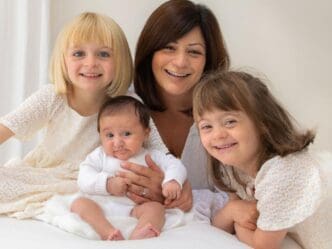Nina Goodwin never imagined herself as a mother of three, especially not in her forties. However, life threw a curveball when her first daughter, Mabel, was born with Down syndrome. This unexpected turn of events shifted her perspective on family and care.
Initially, Nina and her husband, Will, had different visions for their family size. While Will dreamed of a big family, Nina was content with two children. She recalls telling him, ‘I’m the one who’s got to carry that child,’ emphasizing her hesitation to expand their family.
The arrival of Mabel changed everything. With the diagnosis of Down syndrome, Nina experienced a mix of shock and grief. The notion of having more children, especially with the risk of them also being neurodivergent, was daunting. Yet, as she connected with the Down syndrome community, she noticed a common thread: many children with Down syndrome had several siblings. This brought about a crucial realization for Nina—siblings could offer Mabel companionship and support, potentially lessening the feeling of isolation. Enter Nancy, their second daughter, who quickly formed a close bond with Mabel.
As the girls grew, it became evident that Nancy would soon surpass Mabel in her development. By age five, Nancy was already stepping into a caretaking role, helping Mabel with daily tasks. Mabel often playfully commanded, ‘You be mom, Nancy, you be mom!’
Despite the heartwarming relationship between her daughters, Nina harbored a deeper concern. She feared that Nancy might bear the lifelong responsibility of caring for Mabel, especially in the absence of their parents. This worry weighed heavily on Nina, igniting thoughts of adding another child to their family to share the emotional and physical responsibilities of Mabel’s care. Thus, the decision to welcome Edith into the world was made.
The journey to have Edith was fraught with challenges. Nina faced misunderstandings from friends, endured three miscarriages, and grappled with the toll on her mental and physical health. At times, she felt like she had aged two decades since she first became a mother. However, the minute Edith was born, Nina felt a burden lift. She had arranged for Mabel’s future, establishing a trust fund to ensure her life’s aspirations could be fulfilled independently.
Nina acknowledges the taboo surrounding the guilt associated with raising a child with disabilities. Yet, she expresses hope that Mabel will grow into a strong, independent person, just like her siblings. For all her children, Nina’s message is clear: support each other and pursue happiness.
Looking forward, Nina hopes that all her daughters will have the freedom to explore their paths without the weight of obligation. She is dedicated to setting them up for fulfilling lives, confident that she has done her utmost to prepare them for the future.
Nina’s journey underscores the unpredictable nature of life and the profound love that drives parental decisions. Despite the challenges, she finds solace in knowing that her children will have each other. For Nina, expanding her family was not just about adding a child but about ensuring a support system for Mabel when she’s no longer around.
Source: Yahoo







